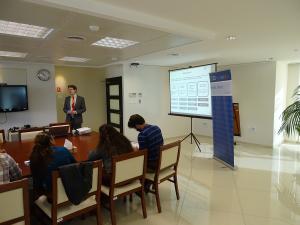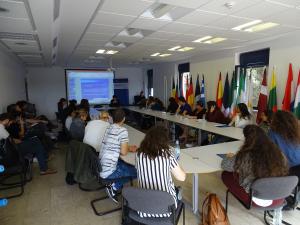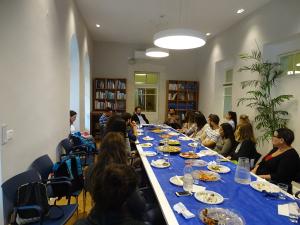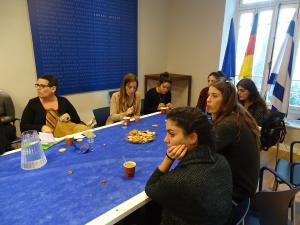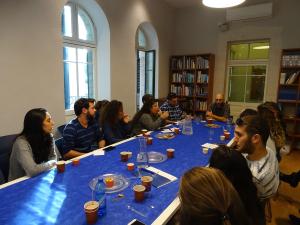We started the day with visiting the Quarter Office, where the students received a briefing by Mr. Johan Berggren, Chief of Staff, Quartet Office. After short greetings by Mr. Stas Linchevsky, the responsible project manager at the KAS office Jerusalem, Quartet Office’s representative, Mr. Berggren, started his presentation. The Quartet Office is a non-political Institution that is related to the Quartet on the Middle East, with its members The EU, The UN, The US and Russia. The Quartets’ Office mandate is to work with the development side of relevant partners in Israel and the Palestinian Territories to improve the economic and institutional situation in the Palestinian Territories. All decisions and projects are based on the idea of the two-state-solution. Their work is focused on infrastructure, law and governance as well as on movement and trade. In the last years the Quarter Office and its partners achieved a huge impact on the infrastructure in Gaza, by implementing a gas pipeline, which connected to the Israeli gas grid. Since the current economic situation in the Palestinian Territories is in a bad shape – negative trade balance and weak GDP – this remains one of its main tasks to improve the economic growth in the territories. Beside this, the Office of the Quartet and its partners strengthen the justice system and the security sector by, for example, by working with the Palestinian police on improving their access to Zone A in the Palestinian Territories. As a conclusion, Mr. Berggren gave a prospect for future development of the Israeli-Palestinian conflict. He said that as a man-made conflict, it needs to be solved man-made as well, but the political willingness to solve the problem right now – on both sides – is less than ever, it even goes in the wrong direction. Mr. Berggren pointed out that also good things have been happening in the last years, especially in relation to young people. He made an appeal to the students, saying, that they shouldn’t belief in any propaganda but should try to connect an exchange with the Palestinians between themselves, as the only way of understanding each other.
We continued the day with visiting the EU Delegation in East Jerusalem, where the students had a chance to meet with Mrs. Ulrike Hauer, Head of Political Section at the Office of the European Union in the Palestinian Territories.
Mrs. Ulrike Hauer, Head of Political Section Office of the European Union, held a presentation about the current role of the European Union in the Palestinian Territories. Similarly to the Quartet Office, the EU works with relevant partners on Israeli and Palestinian side to improve the economic and institutional situation – always in respect to the two-state-solution. Projects are mainly implemented in Gaza and the West Bank and deal with water, infrastructure and economic development issues. Problems and obstacles affecting the peace process in the Middle East and by implication the EU’s work, are the different positions between Israel and the EU regarding boarders, settlements, Gaza and Area C. Mrs. Hauer stated that she doesn’t see a near term solution of the conflict – the election of Donald Trump raises even more questions and insecurity in the region. In her opinion both governments, Israeli and Palestinian, are too weak right now to enforce and implement peace process decisions. The only opportunity, at the moment, is to do small steps on the ground hence improving the economic situation of the Palestinian territories and to regain confidence in both sides. Responding to a question raised she added that since Europe has to handle a lot of its own problems, especially caused by the refugee crisis, there has been a lack of attention recently for the Middle East. Since the member states have drifted apart of the key issues, the EU less able to move forward with its work in the Palestinian Authority.
After the discussion at the delegation, the students continued to the office of the Konrad-Adenauer-Stiftung in Jerusalem, where they had a short lunch break, which followed by four more interesting discussions.
Dr. Michael Borchard, the director of the Konrad-Adenauer-Stiftung in Israel welcomed the students at the KAS office in Jerusalem and gave an introduction on the work of the KAS in Israel and presented the foundation’s guiding principles. The work of the KAS is based on the following main pillars: the two-state solution, the relations of Germany and the European Union with Israel and the interreligious dialogue. The KAS also deals with topics as economic innovation because of Israel’s leading role as a startup nation. In regards to the perception of the European Union in Israel Dr. Borchard points out that the impact of the EU is still underestimated, as it is not just the sum of the member states positions but has its own power and political agenda. The surveys that KAS conducted (and in cooperation with the BGU) showed on a regular basis that the favorability of the EU among Israelis is steadily declining. Nevertheless Germany is perceived as a defender of Israel inside the EU. One decision that has especially influenced the EU’s perception in a negative way is the labelling of products that were made in Israeli settlements. Even though the labelling affects only one percent of the products that are exported to the EU Dr. Borchard believes that it was a wrong decision because it was perceived as a call to boycott Israeli products.
Dr. Borchard also pointed out that the negative image of the EU is a problem because it overshadows the positive aspects of cooperation with the EU. As an example he named the Horizon 2020 program which supports research and innovation funding. Israel was the first country outside of Europe that joined this program and profited from its funding. But it is not just Israel that profits from cooperation with the EU. In terms of competitiveness in the global economy the European countries can profit from Israel’s experience and input especially in the area of high-tech and innovation.
The next presentation was given by Marc Frings, the director Konrad-Adenauer-Stiftung in the Palestinian Territories. He pointed out that his office shows that KAS is not just interested in strategic partnerships with industrialized countries but also puts an emphasis on developing countries. The region in general is very important to KAS which explains why we have offices in (almost) all the countries of the Near and Middle east. The office in Ramallah was founded during the peak of the Oslo Accords when the two-state solution seemed very close. Mr. Frings pointed out that in order to understand the situation in the Palestinian Territories it is inevitable to pay attention to the different situations in the West Bank, in East Jerusalem and in the Gaza Strip. In their work, KAS Ramallah focusses on the young generation that will eventually take over the responsibilities, for example through the award of scholarships. The high unemployment rate and the resulting frustration among the young Palestinians is a major problem. According to Mr. Frings the authorities lack a strategic approach to deal with this problem. In the Gaza Strip he observed unexpected optimism of the young generation and their development of a startup scene. But this positive development is limited by electricity and water shortage. In general the Gaza Strip depends heavily on foreign aid. The reconstruction of the infrastructure in the Gaza Strip for example is funded by many actors such as Germany and the EU but also by Qatar and China. In regards to the perception of the EU, Mr. Frings explained that the Palestinians have a very realistic perspective on Germany’s possibilities. The EU gives Germany more room for critical action which it would not have acting on its own. Therefore the expectation towards Germany is simply not to block decisions within the EU concerning the interests of the Palestinians. A specific example of the EUs action in the Palestinian territories is the support of construction within the Area C of the West Bank. The latest French Peace Initiative is in Mr. Frings view a good opportunity to focus the international attention on the conflict even though it might probably not be a solution. It is also welcomed by the Palestinians because they favor a multilateral over a bilateral approach.
After that, the students had the chance to hear about the EU role from an Israeli perspective from Mr. Shmuel Revel, Head of Europe Division in the Ministry of Foreign Affairs Israel.
In his contribution, Mr. Revel discussed the impact of the Arab revolution on the European Union. Ten years ago the expectation was that the EU will foster stability in the countries surrounding it. In the light of the enlargement process a convergence towards the EU was expected. After the fall of the iron curtain the EU began to negotiate bilateral association agreements with many countries surrounding it but also started a multilateral approach with the Barcelona process. This process aimed at promoting democratic development; establish trade agreements and cultural cooperation. According to Mr. Revel we face a quite different situation today in which the Arab spring destabilizes and weakens the European integration process. The Two main effects in this regard are the migration into the EU and the dangers of Terrorism. Mr. Revel stated that The EU’s impact on the conflicts of the region is low because the EU had only focused on soft power while all other regional powers currently remain on hard power. He also stressed that the Middle East is just one out of many issues the EU deals with at the moment and is not on top of the priority list. Mr. Revel also presented Israel’s perspective on the role of the EU. Even though there are disagreements on the political level many European countries aim at close strategic ties with Israel. The Israeli expertise is not only valued in the field of counter terrorism but also in the fields of high-tech innovation and energy security. Mr. Revel pointed out that the EUs position towards Israel entails several misperceptions. From his standpoint a solution of the conflict cannot come from the outside Mr. Revel expects the peace process to be a very slow and gradual development. He also describes a lack of empathy towards the Israelis from Europeans who come from a very different social background. In this regard there is an overemphasis on the settlement issue. For Israel the main problem is that most Arab countries do not recognize Israel’s right to exist, especially not as a Jewish state. For the future many challenges lie ahead, as the population growth in the Arab world will create a demand for millions of jobs. But there is also potential, according to Mr. Revel, as the trade within the region is still on a very low level and offers a potential for growth and further cooperation.
To conclude the interesting day of lectures, the students got to hear about the local religious element in regards to the EU role from Mr. Eran Tzidkiyahu, a research fellow at the Forum for Regional Thinking and a PhD candidate at the Paris Institute of Political Science. In his presentation he discussed the importance of cultural roots in order to understand the conflict between Israel and the Palestinians. A very important concept we have to understand is secularism as a western European concept that emerged after the reformation and the following wars. It is crucial to understand that most other regions of the world did not undergo the same process. Even today it is still a contested issue in Europe especially with today’s immigration of Muslims who did not have a similar process in their societies. Religion is also an important factor when it comes to national movements. As an example Mr. Tzidkiyahu names Zionism which is a theological concept that was promoted by a secular movement. Also the Arab national movement was led by a religious leader. On this basis Mr. Tzidkiyahu tried to answer why this conflict draws so much attention in comparison to other conflicts around the world. The answer lies in the religious importance of the Holy Land and especially Jerusalem for Jews, Christians and Muslims. In this regard the conflict between Israel and the Palestinians resembles the frontline between the west and the east respectively between Christianity and Islam. Because of their secular background it is difficult for Europeans to deal with religious affairs and language. According to Mr. Tzidkiyahu the heated discussion of the UNSESCO over the Temple Mount resolution is just one example. Because secularism as a concept didn’t work, Tzidkiyahu suggests integrating religion in order to find a peaceful solution. International law might not be the right legal tool to deal with the holy sites. Because of the fact that religion is part of the conflict it is important and inevitable to include religious leaders in the peace process itself.



